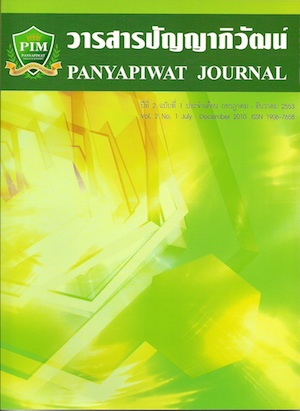ความสัมพันธ์ระหว่างวัฒนธรรมองค์การและการจัดการความรู้ของผู้ประกอบการ SMEs
Main Article Content
บทคัดย่อ
บทคัดย่อ
บทความนี้นำเสนอเกี่ยวกับความสัมพันธ์ระหว่างวัฒนธรรมองค์การและการจัดการความรู้ของผู้ประกอบการธุรกิจ SMEs ซึ่งมีประเด็นสำคัญเริ่มตั้งแต่ความหมาย กระบวนการ ข้อจำกัดของการจัดการความรู้ และยังได้กล่าวถึงความหมายของวัฒนธรรมองค์การและรูปแบบของวัฒนธรรมองค์การรูปแบบต่างๆ และมีการเปรียบเทียบความแตกต่างระหว่างวัฒนธรรมองค์การแบบเดิม และวัฒนธรรมองค์การที่อยู่บนพื้นฐานของความรู้ เพื่อทำให้ผู้ประกอบการเกิดความเข้าใจในเรื่องวัฒนธรรมองค์การมากขึ้น นอกจากนี้ยังศึกษาความสัมพันธ์ระหว่างวัฒนธรรมองค์การและการจัดการความรู้ และชี้ให้เห็นถึงความสำคัญและความจำเป็นที่ผู้ประกอบการธุรกิจ SMEs ต้องคำนึงถึงวัฒนธรรมองค์การ ก่อนที่จะมีการนำการจัดการความรู้เข้ามาใช้ในองค์การ
คำสำคัญ : วัฒนธรรมองค์การ, การจัดการความรู้, ผู้ประกอบการ SMEs
Abstract
This article examines the relationship between organizational culture and knowledge management of SME entrepreneurs. The main issues include definition and barriers to the knowledge management processes and the meaning of organizational culture. Moreover, different forms of organizational culture are compared. Entrepreneurs in SMEs need to consider organizational culture because it is very crucial basis for the implementation of knowledge management into the organization.
Keywords : Organizational Culture, Knowledge Management, SME Entrepreneurs
Article Details
“ข้าพเจ้าและผู้เขียนร่วม (ถ้ามี) ขอรับรองว่า บทความที่เสนอมานี้ยังไม่เคยได้รับการตีพิมพ์และไม่ได้อยู่ระหว่างกระบวนการพิจารณาลงตีพิมพ์ในวารสารหรือแหล่งเผยแพร่อื่นใด ข้าพเจ้าและผู้เขียนร่วมยอมรับหลักเกณฑ์การพิจารณาต้นฉบับ ทั้งยินยอมให้กองบรรณาธิการมีสิทธิ์พิจารณาและตรวจแก้ต้นฉบับได้ตามที่เห็นสมควร พร้อมนี้ขอมอบลิขสิทธิ์บทความที่ได้รับการตีพิมพ์ให้แก่สถาบันการจัดการปัญญาภิวัฒน์หากมีการฟ้องร้องเรื่องการละเมิดลิขสิทธิ์เกี่ยวกับภาพ กราฟ ข้อความส่วนใดส่วนหนึ่งและ/หรือข้อคิดเห็นที่ปรากฏในบทความข้าพเจ้าและผู้เขียนร่วมยินยอมรับผิดชอบแต่เพียงฝ่ายเดียว”
เอกสารอ้างอิง
Davenport, T. H., and Prusak, L. (2000). Working knowledge: How organizations manage what they know. Boston: Harvard Business School Press.
Denison, D. R., and Neale, W. (2001). Organi-zational culture survey. Retrieved November 1, 2008, from http://www.denisonsurvey.com/DenisonOCS/_common/OCS_Start.asp
Drucker, P. F. (1998). The Coming of the new organization. Harvard Business Review, 66(1), 1-19.European Guide to Good Practice in KM. (2004). Part 5: SME implementation KM Terminology CWA14924-5. Retrieved July 1, 2010, from http://michel.grundstein.pagespersoorange.fr/References/CEN_Final_Publication_0403/CWA14924_03_2004_Mar.pdf
Gordon, J. R. (1990). Management and organi-zational behavior. Boston: Allyn and Bacon.
Holowetski, A. (2002). The Relationship between knowledge management and organizational culture: An examination of cultural factors that support the flow and management of knowledge within organization. Retrieved November 1, 2008, from http://aim.uoregon.edu/Research/pdfs/Holowetzki2002.pdf
Lemken, B., Kahler, H., and Rittenbruch, M. (2000). Sustained knowledge management by organizational culture: Paper presented at the Proceedings of the 33rd Annual Hawaii International Conference. Retrieved November 1, 2008, from http://ieeexplore.Ieee.org/xpl/freeabs_all.jsp?arnumber=926701
Nonaka, I., and Takeuchi, H. (1995). The Knowledge-creating company: How Japanese companies create the dynamics of innova-tion. New York: Oxford University Press.
Schein, E. H. (1991). Organizational culture and leadership. San Francisco: Jossey-Bass.
Vecchio, P. R. (2006). Organizational behavior: Core concepts.6th ed. Australia.: Thomson/South-Western.


